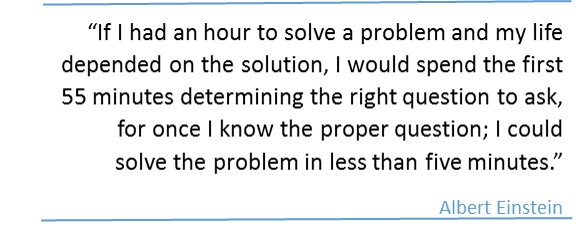Where would we be if no questions were asked? Without questions, there is no search for answers, no thinking. Knowledge would remain static. We would be prisoners of the past. Asking questions is therefore seriously important. But asking the right question is a challenging task. Einstein was of the opinion that identifying the right question would enable him to pinpoint the exact information he needed to answer his problem. From there getting to the answer would be a relatively easy step.
 People who develop new knowledge are driven by curiosity and aspiration. They know that flawed assumptions are the largest factor in flawed execution. They challenge the dogma and seek answers. Therefore, they ask questions. Questions are the foundation that builds reason for change. Progress starts with questioning status quo. The more vibrant your field of engagement is, the more important to ask questions to make learning happens faster.
People who develop new knowledge are driven by curiosity and aspiration. They know that flawed assumptions are the largest factor in flawed execution. They challenge the dogma and seek answers. Therefore, they ask questions. Questions are the foundation that builds reason for change. Progress starts with questioning status quo. The more vibrant your field of engagement is, the more important to ask questions to make learning happens faster.
Improve the quality of your questions is the most immediate thing you can do to develop and deepen your knowledge. Asking a question clearly is a big part of the way getting it answered. Answers can only be as meaningful as the questions are. Questions hold the power to cause us to think and create answers we believe in. The usefulness of the knowledge we acquire and the effectiveness of the actions we take depends on the quality of the questions we ask. Questions that leads to creating powerful answers deserve being called Power questions.
Power questions challenge our thinking. They throw cold water on our most dearly held assumptions and force us out of our traditional thinking. They help us think about tomorrow instead of defending yesterday. They motivate us to learn and discover more. They give us better insights. They help us go from the current view of the situation to a better view of the situation. Questions are the keys to opening locked doors. You create your opportunities by asking for them through power questions.
Soon four years ago IBM’s supercomputer Watson challenged human Jeopardy champion and won the American Jeopardy. This proves that computers can answer questions better than people can, provided the facts are made accessible for them. For sure was this a lasting mark on the history of Jeopardy and for the laboratories of IBM, who succeeded to richly encode human knowledge.
There are good reasons to be fascinated by ever more powerful computers and the new world they are opening up, which by no doubt will continue to alter our worldview, way of thinking and behavior. We must nevertheless not lose our foothold.
In spite of all great strides are we still far from having computers that can ask meaningful questions. For doing that, the computer would need to understand the inner-lives of the situation. To do that, it would need not only to think in the sense of queries given to it, but also experientially in the sense of having awareness. Such a modus operandi is forever closed off to a computer. It goes beyond the definition of what a computer is.
There will never be a Brave New World, Nineteen Eighty-Four or Hal 9000 where computers do it all. Much has been written about artificial intelligence, expert systems, neural networks, and the likes. But none of these is anything more than the application of human-defined rules, processes and an extension of information management mechanisms. Whether the information becomes questions leading to decisions marked by wisdom is out of control of the computer and what is built upon it.
 To compete in the questionrace you will have to realize that computers can be of great help. Digital tools magnify the abilities that make us unique in the world: the ability to think, the ability to articulate our thoughts and the ability to work together to act on those thoughts. But lay off the paralyzing thought that computers can help you ask questions. Questions start and ends with the human individual. Curiosity and aspiration for better productivity and freedom will continue stimulate learning and thrive. You create your opportunities by asking for them. It is the reason to keep query: What, How, When, Who, Where, and Why?
To compete in the questionrace you will have to realize that computers can be of great help. Digital tools magnify the abilities that make us unique in the world: the ability to think, the ability to articulate our thoughts and the ability to work together to act on those thoughts. But lay off the paralyzing thought that computers can help you ask questions. Questions start and ends with the human individual. Curiosity and aspiration for better productivity and freedom will continue stimulate learning and thrive. You create your opportunities by asking for them. It is the reason to keep query: What, How, When, Who, Where, and Why?
As we enter an era of intense digital transformation where the cause and effect relationships are not always immediately apparent, it is imperative to confront brutal facts and ask questions to opening up new perspectives. Power questions provoke thoughtful exploration and inspires lateral thinking. We cannot solve problems on the same level of thinking that created them.
How can we get better at asking power questions? Here are some food for thought:
1. Start with asking yourself a tough question, “Why do I strongly believe what I believe?” Examine your assumptions mean extending your comfort zone and prepare for new opportunities. It takes courage. But, you are never brave before you have done it; bravery emerges from the good feeling of achievement. As with developing any skill, the best teacher is experience and the best coach is a thoughtful listener.
2. It is not about just asking questions but asking the right questions. To that end, you need to establishing facts about the subject and then attribute meaning to these facts through value judgments. If you cannot frame and explain the question well, it can be because you do not understand the subject well enough. Then, you have to work on that. Believing you can ask power questions about something you do not know anything about is a delusion.
3. The management guru Peter Drucker is famous for his five opening questions when meeting with a new business. These are good questions, but they are not self-explaining. Why would he else write 39 books where elaborating on these questions is the essential theme? Drucker knew that when a good question also is properly explained it is much easier to start other minds along a stimulating line of thought.
4. Power questions typically transcend many boundaries and therefore often requires research and assessment. It is important that your best findings are framed as questions rather than big hairy problems. Questions are not supposed to end with an exclamation point but with a question mark. You therefore need to think carefully about the real question underneath everything you have discovered.
5. What will happen in 25 years’ time? – is no power question. It is outside the scope of most people’s interest and capacity to take effective action. Knowledge emerges in response to compelling, relevant and adequate questions. Questions should clarify the scope and keep them in realistic boundaries and needs of the situation at hand. To do it right you need to keep the main thing, the main thing, simplify as much as possible and sacrifice the “perfect” for the “good enough”.
